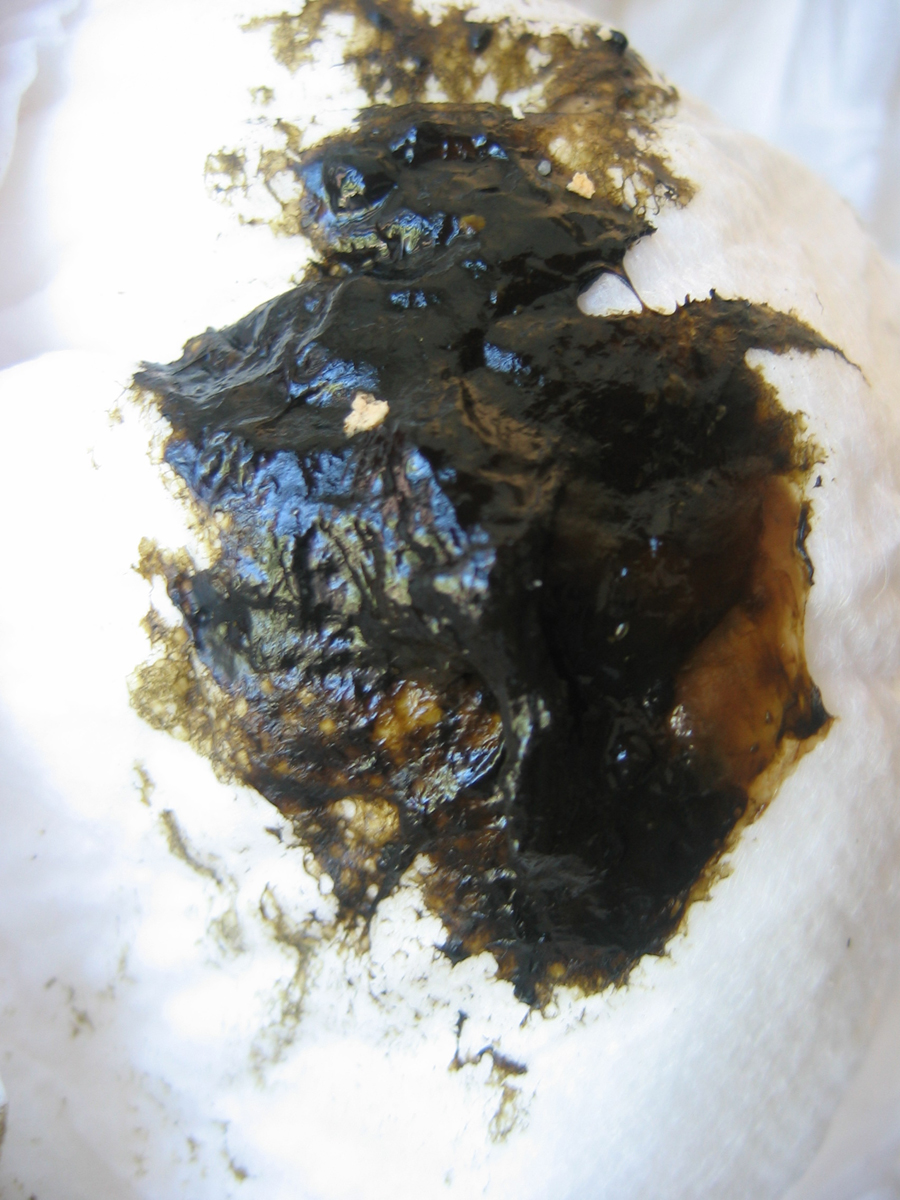Meconium
Editor-In-Chief: Prab R Tumpati, MD
Obesity, Sleep & Internal medicine
Founder, WikiMD Wellnesspedia &
W8MD medical weight loss NYC and sleep center NYC
| Meconium | |
|---|---|

| |
| Synonyms | |
| Pronounce | N/A |
| Specialty | N/A |
| Symptoms | Passage of dark green, tar-like stool |
| Complications | Meconium aspiration syndrome, intestinal obstruction |
| Onset | Newborn period |
| Duration | |
| Types | N/A |
| Causes | Normal fetal waste product |
| Risks | |
| Diagnosis | Observation of stool characteristics |
| Differential diagnosis | Neonatal stool disorders |
| Prevention | |
| Treatment | |
| Medication | |
| Prognosis | Generally benign |
| Frequency | Occurs in all newborns |
| Deaths | N/A |
Meconium is the first stool passed by an infant, typically within the first 24 to 48 hours after birth. It is a thick, green, sticky substance that is produced in the intestines of the fetus and differs significantly from feces passed later in life.
Composition[edit | edit source]
Meconium is made up of materials the fetus has ingested while in utero. These include intestinal epithelial cells, lanugo (fine, soft hair that covers the fetus's body), mucus, amniotic fluid, water, and bile, a digestive fluid produced by the liver. Contrary to normal feces, meconium lacks any microbial constituents as the fetal intestines have not yet been colonized by bacteria.
Appearance and Texture[edit | edit source]
Meconium's color ranges from very dark olive green to black, largely due to the presence of bile. Its consistency is viscous and sticky, often compared to tar. When mixed with amniotic fluid, it may take on various shades of green, brown, or yellow.
Passage[edit | edit source]
Typically, a newborn will pass meconium in the first few days following birth. The transition from meconium to normal stool is marked by a change in color and consistency, as the stool becomes less sticky and more yellow - a reflection of digested breast milk or formula.
Clinical Significance[edit | edit source]
Meconium's presence in the amniotic fluid, a condition known as meconium-stained amniotic fluid (MSAF), can indicate fetal distress during labor and delivery. If the meconium is aspirated into the infant's lungs, it can cause meconium aspiration syndrome, a severe respiratory condition.
Gallery[edit | edit source]
References[edit | edit source]
| This article is a medical stub. You can help WikiMD by expanding it! | |
|---|---|
Pediatric glossary of terms | Glossary of medical terms | Dictionary of pediatrics
Search WikiMD
Ad.Tired of being Overweight? Try W8MD's physician weight loss program.
Semaglutide (Ozempic / Wegovy and Tirzepatide (Mounjaro / Zepbound) available.
Advertise on WikiMD
|
WikiMD's Wellness Encyclopedia |
| Let Food Be Thy Medicine Medicine Thy Food - Hippocrates |
Translate this page: - East Asian
中文,
日本,
한국어,
South Asian
हिन्दी,
தமிழ்,
తెలుగు,
Urdu,
ಕನ್ನಡ,
Southeast Asian
Indonesian,
Vietnamese,
Thai,
မြန်မာဘာသာ,
বাংলা
European
español,
Deutsch,
français,
Greek,
português do Brasil,
polski,
română,
русский,
Nederlands,
norsk,
svenska,
suomi,
Italian
Middle Eastern & African
عربى,
Turkish,
Persian,
Hebrew,
Afrikaans,
isiZulu,
Kiswahili,
Other
Bulgarian,
Hungarian,
Czech,
Swedish,
മലയാളം,
मराठी,
ਪੰਜਾਬੀ,
ગુજરાતી,
Portuguese,
Ukrainian
Medical Disclaimer: WikiMD is not a substitute for professional medical advice. The information on WikiMD is provided as an information resource only, may be incorrect, outdated or misleading, and is not to be used or relied on for any diagnostic or treatment purposes. Please consult your health care provider before making any healthcare decisions or for guidance about a specific medical condition. WikiMD expressly disclaims responsibility, and shall have no liability, for any damages, loss, injury, or liability whatsoever suffered as a result of your reliance on the information contained in this site. By visiting this site you agree to the foregoing terms and conditions, which may from time to time be changed or supplemented by WikiMD. If you do not agree to the foregoing terms and conditions, you should not enter or use this site. See full disclaimer.
Credits:Most images are courtesy of Wikimedia commons, and templates, categories Wikipedia, licensed under CC BY SA or similar.
Contributors: Prab R. Tumpati, MD



